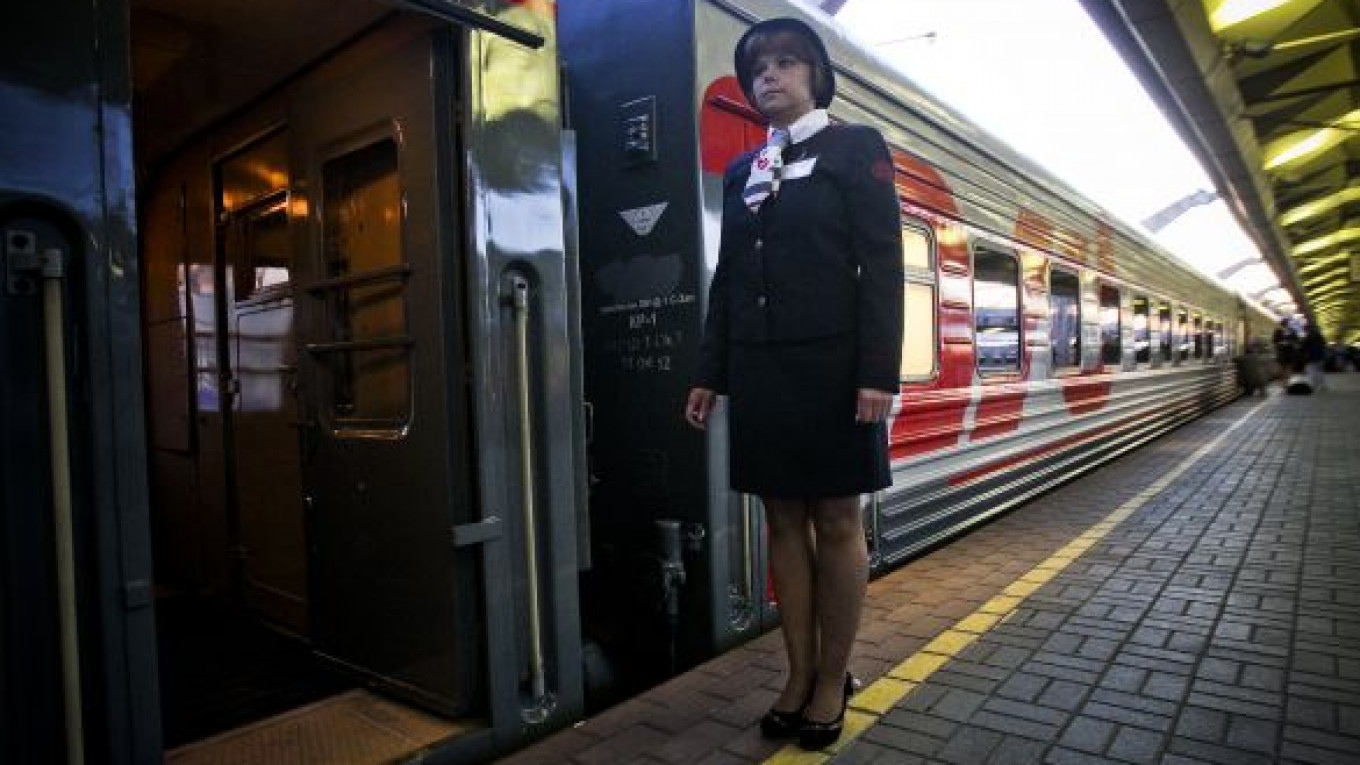Russian Railways will invest in a massive overhaul of its passenger services in the next 15 years as it battles to stave off increasing competition from airlines on long-distance routes.
The state-owned monopoly plans to invest 105.7 billion rubles ($3.4 billion) in the Federal Passenger Co., the subsidiary that runs long-distance passenger services, by 2015. An additional 668.8 billion rubles will be pumped into the company between 2016 and 2030.
The funds will largely go toward a wholesale expansion and overhaul of its fleet of passenger cars, with the company setting out to acquire 16,500 new cars, Kommersant reported Tuesday. The Federal Passenger Co. currently operates 23,700 such railcars.
According to the Federal Passenger Co.’s strategic development plan to 2030, intercity rail services will see only a 10 percent increase in passengers in the next 15 years as airlines bite into the share of the travel market. The plan concedes that the challenge from airlines is seriously affecting rail traffic.
The Federal Passenger Co. carried 101.7 million passengers in 2011 and expects that number to rise to 112.2 million by 2030.
Other planned tactics include greater use of airline-style price escalators, by which tickets are priced according to demand and expected load, and price adjustments to reflect competition from airlines and bus services.
The strategy is likely to see an increase in ticket prices, with fares in the regulated segment going up an average of 3.2 percent a year in the period up to 2030 in an effort to close the company’s current operating deficit.
Prices for third-class tickets in the platzkart section, open-plan barrack rooms similar to sleeper carriages, are regulated by the government to ensure affordability and keep a lid on inflation, while rates for more expensive second- and first-class compartments are not controlled.
Russian Railways president Vladimir Yakunin told The Moscow Times in an interview in June that while platzkart makes up about 70 percent of ticket sales, second-class and first-class tickets bring in 70 percent of revenues.
The Federal Passenger Co. turned a profit of 110 million rubles in 2011, which was possible only thanks to 29.5 billion rubles in state subsidies, Kommersant reported.
Another strategic goal for the company is increasing online ticket sales to 40 percent versus the current share of 15 percent.
“Russians are becoming more pragmatic. Their time is more valuable, and they are prepared to pay more to travel quickly rather than spend a long time on a train,” said Andrei Rozhkov, a transportation analyst at Metropole. “[The Federal Passenger Co.] strategy acknowledges that challenge,” he said.
Transportation Minister Maxim Sokolov ruled out privatization of Russian Railways this year, saying such a deadline would be “technically impossible,” Interfax reported. The government has said it wants to privatize 25 percent minus one share of the company sometime in 2012 or 2013.
Analysts say the government will have to introduce a more transparent mechanism for setting cargo tariffs, the company’s main source of income, before interesting investors enough to justify the IPO.
Related articles:
A Message from The Moscow Times:
Dear readers,
We are facing unprecedented challenges. Russia's Prosecutor General's Office has designated The Moscow Times as an "undesirable" organization, criminalizing our work and putting our staff at risk of prosecution. This follows our earlier unjust labeling as a "foreign agent."
These actions are direct attempts to silence independent journalism in Russia. The authorities claim our work "discredits the decisions of the Russian leadership." We see things differently: we strive to provide accurate, unbiased reporting on Russia.
We, the journalists of The Moscow Times, refuse to be silenced. But to continue our work, we need your help.
Your support, no matter how small, makes a world of difference. If you can, please support us monthly starting from just $2. It's quick to set up, and every contribution makes a significant impact.
By supporting The Moscow Times, you're defending open, independent journalism in the face of repression. Thank you for standing with us.
Remind me later.






